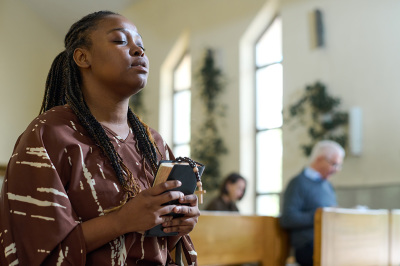How Psalm 100 teaches us how to practice true thanksgiving

We have been working through Psalm 100 and considering five principles that are critical for believers of Jesus Christ to understand as we reflect on the Lord’s call to give Him thanks.
The first principle was the Proclamation of Thanksgiving. The second is the Practice of Thanksgiving.
Notice verse 2. “Serve the LORD with gladness.” Then verse 4 toward the end: “Give thanks to Him.” These two statements, although perhaps not as evident in our translation, have official religious service ideas behind them. That’s why the NIV translates verse 2, “Worship the LORD with gladness,” recognizing the official worship behind the idea of service. Giving thanks, likewise has the idea of an official proclamation of thanksgiving, and together, these words point to a sacrifice of thanksgiving. The idea is the religious observance that someone who is truly thankful practices in their worship of the victorious King.
As we think about this, New Covenant believers, of course, no longer offer sacrifices because Jesus is the once-for-all, final, perfect sacrifice. To offer any other blood sacrifices, or to go back to the sacrifices commanded in the Mosaic Law, would be an insult to the blood of Christ. But the New Testament has many things to say about our acts of service that reflect thanksgiving. For example, in Hebrews 13:15-16, we find this: “Through Him (Jesus), then, let us continually offer up a sacrifice of praise to God.” Now, the letter to the Hebrews has been a long polemic against the Mosaic Law now that Christ has come with a better covenant, a better priesthood, a better everything! So, the writer immediately clarifies what he means when he says a sacrifice of praise to God: “That is, the fruit of lips that give thanks to His name. And do not neglect doing good and sharing, for with such sacrifices God is pleased.”
Here we see the New Covenant believer’s sacrifice of thanksgiving to God. It happens in community, because we can’t do good without someone else, a brother or sister, who benefits from our good work and sharing. The sacrifice of thanksgiving for the new covenant believer is not a ram or a bull or a goat or a grain offering, but it is lips that thank God out loud in the covenant community and a life that shows gratitude through generosity. That’s the practice of thanksgiving: gratitude reflected in word and deed.
The third principle contained in Psalm 100 is the Place of Thanksgiving.
Now this is fascinating. Notice verse 2 again. “Come before Him with joyful singing.” And the parallel is in verse 4: “Enter His gates with thanksgiving and His courts with praise.” This is a powerful truth. The place of thanksgiving, to put it simply, is before the face of God — in His presence.
When the Psalmist says in verse 2, “Come before Him with joyful singing,” he undoubtedly has the Temple in mind. That’s why in the parallel, he references the gates of God and the courts of God, which are clear references to Temple worship in Israel. This is significant for at least two reasons. First, remember the call-in verse 1 is to all the earth. God has called all nations to come into His temple to worship Him, thank Him, and give Him praise, honor, and glory.
Again, we have one of those mysteries in the Old Testament that could not be fully understood until Christ came. How are the Gentiles going to be able to come into the gates and courts of the Temple of Adonai Yawheh and worship Him? Aren’t they unclean and outsiders? Here, though, we see God calling all the earth to come into His temple, into His very presence, into the place where only holy people are allowed to come, to praise and thank Him.
Second, this is significant because it reminds us that when we give God thanks, we do so in His very presence. God is not far away, off in some other world, distant, watching us from afar as we give Him thanks. Not at all! Rather, when we come together for worship and to give Him thanks, and when we set aside time to show our gratitude to God, we are in His very presence, before His very face. The Lord is near. He hears us, and He is with us. Giving God thanks is a holy, personal communion with the living God. It is a joyful, song-filled, praise-filled, thanksgiving-filled time in presence of God.
The question this raises pertains to the temple. How do we, unclean sinners, get into the presence of God as acceptable to Him? How do we, especially we who are Gentiles, enter God’s courts and His gates? When John wrote his Gospel, the Jerusalem temple was gone, and based on some things John wrote it seems that worship without the temple was a question on many people’s minds, both within and without the church. It comes up in Jesus’ discussion with the woman from Samaria in John 4, where Jesus declares that a day would come when worship would not take place either in Samaria or in Jerusalem, but it would happen in Spirit and truth, almost as if Spirit and truth were geographic locations.
Earlier, in John 2, Jesus told the Jews that if they destroyed the temple, He would raise it up in three days. They were incredulous since it took 46 years to build the temple, but John notes in John 2:21, “But He was speaking of the temple of His body.” The disciples took a while to understand the significance of this. “So, when He was raised from the dead, His disciples remembered that He said this; and they believed the Scripture and the word which Jesus had spoken.” They didn’t get it until after the resurrection. Jesus essentially said, “You try to come into the presence of God by going into a building. The true path to the presence of God is Me. If you want to enter into the gates of God, if you want to enter His courts, if you want to come before Him, I am the only way.”
The place of thanksgiving, then, is in the presence of God not through being in a geographic location but by being in Christ. That’s why Paul wrote in Ephesians 2:18, “For through Him we both (Jews and Gentiles alike) have our access in one Spirit to the Father.”
If we are in Christ, we give thanks to God, not at a distance, but in His very presence, before His face. What a glorious truth that we have access through Jesus to the very presence of God, to the holiest place, and not only that, but God in this Psalm has called us to enter there to give Him thanks.
Dr. Robb Brunansky is the Pastor-Teacher of Desert Hills Bible Church in Glendale, Arizona. Follow him on Twitter at @RobbBrunansky.



























